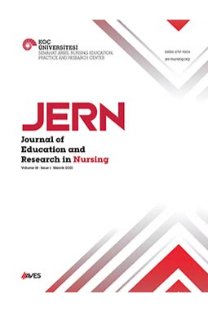Yenidoğan Hemşirelerinin Toplu Bakıma Yönelik Bilgi Düzeyleri ve Etkileyen Faktörlerin Belirlenmesi
Determination of Neonatal Nurses Knowledge Level About Clustered Care and Influencing Factors
___
- 1 . Karabudak SS, Ergün S. Yenidoğan hastalıkları ve hemşirelik bakımı. In: Conk Z, Başbakkal Z, Bal Yılmaz H, Bolışık B, editors. Pediatri Hemşireliği. Ankara: Akademisyen Tıp Kitabevi; 2013. p. 289-352.
- 2 . Bradley C, Ritter R. Developmental care for the sick and preterm infant. In: Kenner C, Loot JW, editors. Compherensive Neonatal Nursing Care. 5th ed. Newyork: Springer; 2014. p. 925-31.
- 3 . Gardner SL, Goldson E, Hernandez JA. The neonate and the environment impact on development. In: Gardner SL, Carter BS, Enzman Hines M, Hernandez JA, editors. Merenstein&Gardner’s Handbook of Neonatal Intensive Care. 8th ed. St Louis: Elsevier; 2016. p. 262-314.
- 4 . Altimier L, White RD. The neonatal intensive care (NICU) environment. In: Kenner C, Lott JW, editors. Compherensive Neonatal Nursing Care. 5th ed. Newyork: Springer; 2014. p. 722-38.
- 5 . Graham YP, Heim C, Goodman SH, Miller AH, Nemeroff CB. The effects of neonatal stress on brain development: Implications for psychopathology. Development and Psychopathology. 1999;11:545-65.
- 6 . Grunau RE. Neonatal pain in very preterm infants: Long-term effects on brain, neurodevelopment and pain reactivity. Rambam Maimonides Med J. 2013;4:e0025. doi: 10.5041/RMMJ.10132.
- 7 . Smith GC, Gutovich J, Smyser C, Pineda R, Newnham C, Tjoeng TH, et al. Neonatal intensive care unit stress is associated with brain development in preterm infants. Ann Neurol. 2011;70(4):541-9. doi: 10.1002/ana.22545.
- 8 . Coughlin ME. Transformative Nursing in the NICU Trauma-Informed Age-Appropriate Care. Newyork: Springer; 2014.
- 9 . Als H. Toward a synactive theory of development: Promise for the assessment and support of infant individuality. Infant Mental Health Journal. 1982;3(4):229-43. doi: 10.1002/1097-0355(198224)3:4<229::AIDIMHJ2280030405> 3.0.CO;2-H.
- 10 . Carrier CT. Developmental suport. In: Verklan MT, Walden M, editors. Core Curriculum for Neonatal Intensive Care Nursing. Philadelphia: Saunders; 2010. p. 208-32.
- 11 . Faye PM, Jonckheere JD, Logier R, Kuissi E, Jeanne M, Rakza T, et al. Newborn infant pain assessment using heart rate variability analysis. Clin J Pain. 2010;26:777-82. doi: 10.1097/AJP.0b013e3181ed1058.
- 12 . Hall RW, Anand KJ. Pain management in newborns. Clin Perinatol. 2014;41(4):895-924. doi: 10.1016/j.clp.2014.08.010.
- 13 . Sarı HY, Çiğdem Z. Gestasyon haftalarına göre bebeğin gelişimsel bakımının planlanması. DEUHYO ED. 2013;6:40-8.
- 14 . Varlı G. Yenidoğan yoğun bakım ünitelerinde çalışan hemşirelerin yenidoğanın bireyselleştirilmiş destekleyici gelişimsel bakımına yönelik bilgi ve uygulamaları [master’s thesis]. Haliç Üniversitesi, Sağlık Bilimleri Enstitüsü; 2016.
- 15 . Yıldız S. Yenidoğan yoğun bakım ünitelerinin organizasyonu. In: Dağoğlu T, Görak G editors. Temel Neonatoloji ve Hemşirelik İlkeleri. İstanbul: Nobel Tıp Kitabevi; 2008. p. 17-29.
- 16 . Godarzi Z, Rahimi O, Khalessi N, Soleimani F, Mohammadi N, Shamshiri A. The rate of developmental care delivery in neonatal intensive care unit. Iran J Crit Care Nurs. 2015;8:117-24.
- 17 . Valizadeh L, Asadollahi M, Gharebaghi MM, Gholami F. The congruence of nurses’ performance with developmental care standards in neonatal intensive care units. J Caring Sci. 2013;2(1):61-71. doi: 10.5681/ jcs.2013.008.
- 18 . Dağoğlu T. Yenidoğanın gelişimi ve çevresel faktörler. In: Dağoğlu T, Görak G, editors. Temel Neonatoloji ve Hemşirelik İlkeleri. İstanbul: Nobel Tıp Kitabevi; 2008. p. 759-68.
- 19 . Karadağ A. Meslek olarak hemşirelik. Atatürk Üniversitesi Hemşirelik Yüksekokulu Dergisi. 2002;5(2):1-8.
- 20 . Kavaklı Ö, Uzun Ş, Arslan F. Yoğun bakım hemşirelerinin profesyonel davranışlarının belirlenmesi. Gülhane Tıp Dergisi. 2009;51(3):168-73.
- 21 . Yılmaz E, Vermişli S. Yoğun bakım ünitelerinde çalışan hemşirelerde meslekte profesyonelleşmenin iş doyumuna etkisi. Yıldırım Beyazıt Üniversitesi Sağlık Bilimleri Fakültesi Hemşirelik Dergisi. 2016;4(1):17- 27.
- 22 . Yüksekol ÖD, Atalay M. Evaluation of professionalism of nurses in the city center of Elazığ, Turkey. International Journal of Health Services Research and Policy. 2017;2(1):14-20. doi: 10.23884/ ijhsrp.2017.2.1.03.
- 23 . Sıbandze BT, Scafıde KN. Among nurses, how does education level impact professional values? A systematic review. International Nursing Review. 2018;65:65-77. doi: 10.1111/inr.12390.
- 24 . Zengin M, Yayan EH, Yıldırım N, Akın E, Avşar Ö, Mamiş E. Pediatri hemşirelerinin profesyonel değerlerinin profesyonel tutumlarına etkisi. HSP. 2018;5(2):1-8. doi: 10.17681/hsp.324725.
- 25 . Sorucuoğlu AY, Tüfekçi FG. Çocuk hemşirelerinde mesleki profesyonel değerler. ACU Sağlık Bil Derg. 2015;6(2):105-9.
- ISSN: 2618-5741
- Yayın Aralığı: Yılda 4 Sayı
- Başlangıç: 2004
- Yayıncı: Koç Üniversitesi HYO Semahat Arsel Hemşirelik Eğitim ve Araştırma Merkezi (SANERC)
Sağlık Bilimleri Fakültesi Öğrencilerinde Abdominal Obezite Sıklığı ve Yeme Farkındalık Düzeyleri
Hilal BARIŞKAN, Azime KARAKOÇ KUMSAR
Hemşirelik Eğitiminde Simülasyonun Kullanılması: Türkiye’de Lisansüstü Tezler Üzerine Bir İnceleme
Yenidoğan Hemşirelerinin Toplu Bakıma Yönelik Bilgi Düzeyleri ve Etkileyen Faktörlerin Belirlenmesi
SİBEL SERAP CEYLAN, TÜRKAN TURAN, ÇİĞDEM ERDOĞAN
Yanıklı Hasta Bakımında Güncel Rehberlerin Önerileri
FATMA VURAL, Nazife Gamze ÖZER ÖZLÜ
Evde Bakım Hemşirelerinde Kültürel Farkındalık
Ezgi DEMİRTÜRK SELÇUK, Havva KARADENİZ
Küreselleşme ile Başlayan Hemşire Göçü: Bulgaristan Durum Analizi
Muhteber HÜSMENOĞLU, Rujnan TUNA
Bilgi, Güven ve Bağlılık Boyutunda Hastaların Hemşire Bakım Davranışı Algıları
Fatma DURSUN ERGEZEN, Havva DİNÇER, Emine KOL, Semiha Aslı BOZKURT
Onkolojide Yeni Bir Tedavi Yöntemi: Elektrokemoterapi Uygulaması
Primipar Gebelerin Doğum Şekli Tercihlerini Etkileyen Etmenlerin Belirlenmesi
